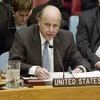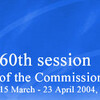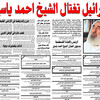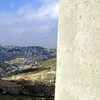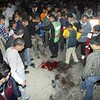
EI on BBC World Service "The World Today"
26 March 2004
On 25 March 2004, EI’s Ali Abunimah was a guest on the BBC World Service’s The World Today programme, commenting on the aftermath of Israel’s assassination of Sheikh Ahmed Yassin and the US veto against the UN resolution condemning the assassination. “The United States has made it clear for many years now that it’s not interested in letting the UN have any role in resolving the Palestine-Israel conflict and it wants that conflict to be resolved or not resolved on its and Israel’s terms.” Listen to the interview in MP3 or 3GP formats (Quicktime Player or Real Player). Read more about EI on BBC World Service "The World Today"



